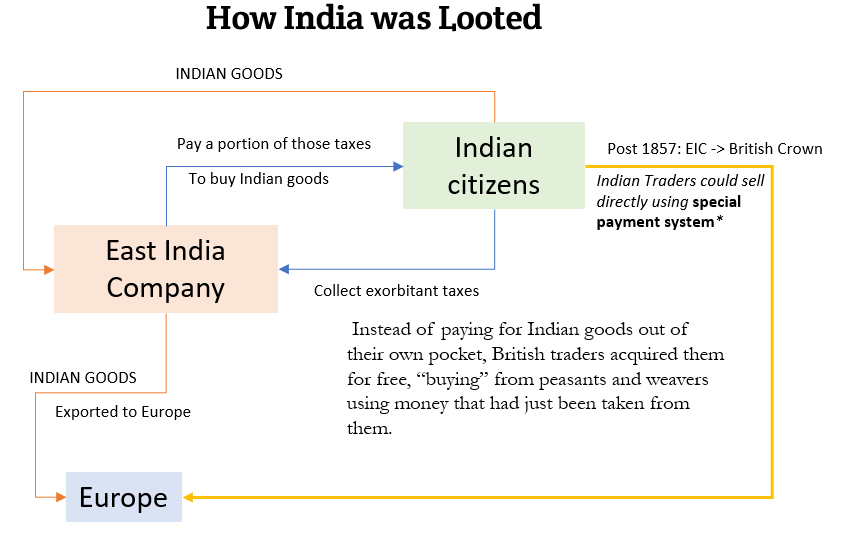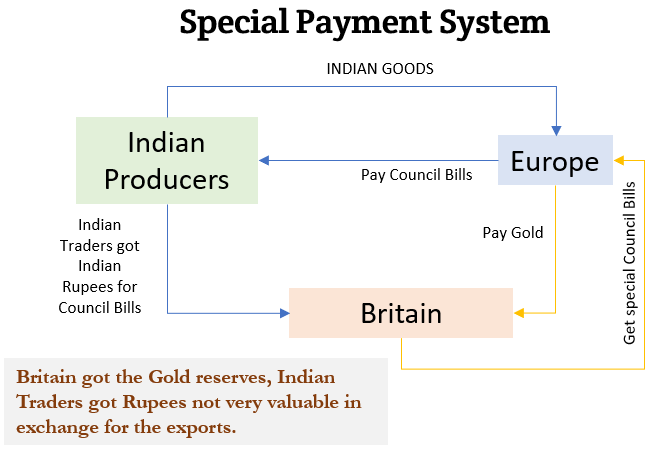Sacralization of Outrage and How to Break Free
When rage is combined with religious and ideological absolutism, avenues of freedoms vanish. Dissent is met with ruthless subjugation and every atrocity is covered up by ambivalence. Let's deep dive.
British Colonial Rule left India a destitute nation. The wealth sucked out by plunder and wicked mechanisms was huge and still adorns the landscape of present day Europe.


Colonialism is an enterprise in entitlement. Crime, unspeakable crime notwithstanding, entitlement of rule over another is a justifying argument. To soothe one's poking humanity.
British opulence, and indeed of most of Europe, including the churches and cathedrals, grand mansions, country houses, manors, libraries, and museums were financed by the loot that led to the worst genocides ever witnessed!
In fact, if one goes deep into the links and connections of those times and actions of the wealthiest and the powerful, one can find that today's wealth distribution and elite establishment have been direct beneficiaries of those wars that established the colonial enterprise.
When those who are casual and careless about how forces of today are constantly undermining the security of a country - situations that could lead to imperialist takeover of their society - they forget that the impacts of colonial and imperial takeovers last several centuries and millennia.
More importantly, the worst impacted are the poorest.
So, be on your highest alert. For, those who intend to colonize you will have no mercy. Their soul is an ally in their egregious enterprise.
From the streets of London, Leamington Spa and Liverpool to the mansions in Aberglasney, Hertfordshire and the rural estates in Banffshire, Berkshire and Caernarvonshire - one can witness the grandeur of Britain.
Powis castle, a craggy fort from the 13th century shows another picture today.
The last hereditary Welsh prince, Owain Gruffydd ap Gwenwynwyn, built Powis castle as a craggy fort in the 13th century; the estate was his reward for abandoning Wales to the rule of the English monarchy. But its most spectacular treasures date from a much later period of English conquest and appropriation: Powis is simply awash with loot from India, room after room of imperial plunder, extracted by the East India Company in the 18th century. (Source: The Guardian)
A grandeur built upon the blood, bodies and loot from India.
From museum displays to grand libraries, heritage sites, public archives, and Country houses, the spoils of a dark past of stolen wealth and plunder are hidden in plain sight!
Plundered wealth from India fueled a growth in UK's luxury real estate. At least 229 manors in UK were bought by officials and merchants returning from India with their wealth.
In 2014, Stephanie Barczewski, a professor at Clemson University, in South Carolina, enlarged the field by considering the interaction between estates and the colonial project as a whole. In her book “Country Houses and the British Empire, 1700-1930,” Barczewski estimated that up to one in six manors were bought with the proceeds of imperialism, with at least two hundred and twenty-nine purchased by officials and merchants returning from India. (Source: New Yorker)
It is not just the buildings and libraries that dot the landscape of the British urban and rural setting, but even the literary world is replete with connections to colonial exploits and situations, conveniently shrugged to the margins. Edward Said has dug deeper into these connections within various literary works in his book "Culture and Imperialism". Most importantly, though, into how Jane Austen's Mansfield Park refers to the colonial connections of its characters in West Indies casually without discussing the sins of slavery.

Even when colonial empire is everywhere in the setting, it's crime is ignored.
The destruction of India was started by a young lieutenant-colonel named Robert Clive, who despite no military background was a skillful soldier.
As it rained in the mango grove areas near the village of Plassey, now known as Palashi - about 100 miles from Kolkata, Robert Clive prepared for an attack on Siraj-ud-Daula's army on the night of June 23, 1757.
After his army of 3000 (2/3rd of Indian sepoys) defeated Nawab's army, Clive rose in prominence and by 1758 was the Governor General of Bengal.
By 1803, the East India Company controlled Delhi and had a private army of two hundred thousand, far larger than the King of England’s. For the adventurers and merchants who took part, it was a time of dizzying enrichment. Diamonds, rubies, and gold bars seized after the battle were auctioned off; soldiers received a share of the proceeds, according to their rank. Back in England, Clive bought six country estates and rented a town house in Mayfair. During two spells in India, he became one of the richest self-made men in Europe. (Source: New Yorker)
In 1770, a major famine unleashed death and destruction on Bengal. The Bengal famine of 1770. It is said that a third of the entire population was gone. The impact of what Clive's men had brought upon the population of Bengal was unimaginable. The numbers of the dead were so huge, that there weren't enough peasants and farmers to till the land anymore in the state!

The statue of this plunderer and colonial brute adorns the area between the British Treasury and the Foreign Office, overlooking St. James’s Park. Very strategic and appropriate, isn't it?

A man who committed suicide as he fought unbearable pain from his own illnesses at the age of 49.
His body was buried in a secret night-time ceremony, in an unmarked grave, without a plaque. Clive left no suicide note, but Samuel Johnson reflected the widespread view as to his motives: Clive “had acquired his fortune by such crimes that his consciousness of them impelled him to cut his own throat”. Clive’s death followed soon after two whistleblowers had revealed the scale of the devastation and asset-stripping of Bengal under his rule. “We have murdered, deposed, plundered and usurped,” wrote Horace Walpole. “Say what think you of the famine in Bengal, in which three millions perished, being caused by a monopoly of the provisions by the East India Company?” That summer, a satire was published in London lampooning Clive as Lord Vulture, an unstable imperial harpy, “utterly deaf to every sentiment of justice and humanity… whose avarice knows no bounds”. (Source: The Guardian)
When he was cornered by his enemies in the British Parliament, as an MP, he defended his track record and in the end famously said:
“I stand astonished by my own moderation."
The utterly tone deaf colonial brutes had absolutely no sense of humanity or reality relative to their unimaginable crimes.
That the wealth and growth of the British nation and prosperity was built on the loot of India was known. The scale of the impact was however not always brought out. It is said that every year around 10% of India's GNP was funneled to Britain under some pretext or the other in 1900s. And this percent of loot had decreased substantially from what had happened in the earlier two centuries.

To fully understand the impact of British plunder on India of today, here is some context.
The British plundered in excess of $45 Trillion from India and 1.8 Billion Indians died from the terrible deprivation caused by the British policies, experiments, and wars.
Eminent Indian economist Professor Utsa Patnaik (Jawaharlal Nehru University) has estimated that Britain robbed India of $45 trillion between 1765 and 1938, however it is estimated that if India had remained free with 24% of world GDP as in 1700 then its cumulative GDP would have been $232 trillion greater (1700-2003) and $44 trillion greater (1700-1950). Deprivation kills and it is estimated that 1.8 billion Indians died avoidably from egregious deprivation under the British (1757-1947). The deadly impact of British occupation of India lingers today 71 years after Independence, with 4 million people dying avoidably from deprivation each year in capitalist India as compared to zero (0) in China. (Source)
Had India been free and not colonized by Britain, the total GDP in 2003 would have been $232 trillion higher than what it was then. By comparison, the US GDP in 2003 was $11.5 trillion (Source)!
The British establishment looted in many ways. After the spoils of the war - diamonds, gold, moneys etc - were taken away from the country, the complex web of taxation and inter-country trade was carefully constructed to enrich Britain and reduce India to a destitute society.
The Modus Operandi of the East India Company created a grand scale sucking of wealth.
Here’s how it worked. The East India Company began collecting taxes in India, and then cleverly used a portion of those revenues (about a third)to fund the purchase of Indian goods for British use. In other words, instead of paying for Indian goods out of their own pocket, British traders acquired them for free, “buying” from peasants and weavers using money that had just been taken from them. (Source)
Here is the illustration of how it actually happened.

That Indians were paying the taxes, a portion of which was used to buy the goods from Indian producers is bad enough, the British were exporting those goods to the other countries in ways that would help them create huge gold reserves while the Indian traders, whose goods were used for this trade, got pittance in the Indian currency.
Basically, anyone who wanted to buy goods from India would do so using special Council Bills - a unique paper currency issued only by the British Crown. And the only way to get those bills was to buy them from London with gold or silver. So traders would pay London in gold to get the bills, and then use the bills to pay Indian producers. When Indians cashed the bills in at the local colonial office, they were “paid” in rupees out of tax revenues - money that had just been collected from them. So, once again, they were not in fact paid at all; they were defrauded. (Source)
Illustrated below.

The Gold that was earned from Indians goods went to the British coffers, while the Indian producers remained poor!
What Clive and his men did to create the famine in 1770, Winston Churchill and his men did in 1943-44 during World War II.
The Bengal famine of 1943 was the only one in modern Indian history not to occur as a result of serious drought, according to a study that provides scientific backing for arguments that Churchill-era British policies were a significant factor contributing to the catastrophe. (Source: The Guardian)
The man who devised the method to manufacture the situation causing the great Bengal Famine of 1943 was none other than the celebrated economist - John Maynard Keynes.
Patnaik’s later work has also examined JM Keynes’ influence on Indian economic policy. In Keynes’ own writings on the Indian budget, ‘a studied silence was always maintained on how exactly rupees in the Indian budget ended up as gold and sterling with Britain’ (Patnaik 2018: 35). Patnaik also notes that the economic management tools Keynes’ advocated to raise finance for the British war effort were implemented in Bengal during 1943-44, while they were rejected as unacceptably ‘vicious’ and burdensome in Britain. Keynes’ policy influence is charged by Patnaik with directly resulting in the three million deaths that occurred during the Bengal famine. This final pre-Independence drain of resources followed the extraction of what Patnaik calculates to be £9,184.41 billion between 1765 and 1938 (Patnaik 2017: 311). (Source)
About 3 million human beings died during the 1943 Bengal Famine.
At its peak, East India Company accounted for half of the global trade (Source).
Nathan Rothschild is known to have used his trade with East India Company to finance the Waterloo battle against Napolean.

It is said that the Rothschild family owned the East India Company.

It is well known though that British elite had Indian elite working with them in the rule and plunder of India. One of them was Dwarkanath Tagore.
He was a wealthy merchant with a fleet of ships of his own. A friend of European elite and the Rothschilds.

Dwarkanath's methods of obtaining wealth, despite the hob-nobbing with the European elite, were questionable. Or maybe, his questionable businesses were the source of his power. Since he could provide to the elites, whores and drugs, that others could not.

Dwarkanath had a strong presence in the opium trade plied by the East India Company.
For Dwarkanath, association with the progressive movement paid rich dividend. It brought him easy access to corridors of power in the Company’s government, and spectacular elevation in his rank at the Board that controlled the two permanent British monopoly trades in salt and opium. Dwarkanath leveraged his position as Dewan of the Board of Customs, Salt and Opium, to forge very close ties with all who mattered in early modern Bengal. He was India’s first ‘socialite’ in the modern sense of the term. He regularly wined and dined with Europeans in his house and also in a Villa he built in the outskirts of the city, at a place called Belgachia. It was a bold act, considering the age; even Rammohun never ate with Europeans even though he sat with them at the dinner table. (Source)
Dwarkanath was Rabindranath Tagore's grandfather.
His mentor - spiritual mentor - if that was even possible, was Raja Ram Mohan Roy.

Between Dwarkanath Tagore and Raja Ram Mohan Roy, the Indian elite set forth the direction for destruction of Indian traditional systems and upholding the importance of British imperial ways to civilize India. A mechanism to ensure that Indians accepted the colonialization without any resentment, despite the large sucking sound of their wealth going West.
Miyamoto Musashi, the legendary Samurai born in 1584, defeated three powerful and strong opponents in special duels. His Strength was that he adapted every time and came up with something that surprised his enemy. An enemy, who had a way to fight, which he did not want to change.

"Too much is the same as not enough" - there are lessons in every part of life. To be in the comfort zone and being established in something deep enough makes us vulnerable.
If you like our content and value the work that we are doing, please do consider contributing to our expenses. CHOOSE THE USD EQUIVALENT AMOUNT you are comfortable with.
If you like this post - please share it with someone who will appreciate the information shared in this edition.
Today’s ONLINE PAPER: Check out today’s “The Drishtikone Daily” edition. - THE DRISHTIKONE DAILY